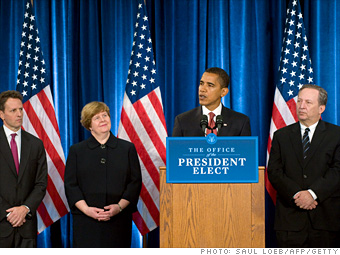House Passes Economic Stimulus Bill

The House passed an $819 billion economic stimulus package on a 244-188 vote.
The American Recovery and Reinvestment Act includes $544 billion in spending and $275 billion in tax relief. The Senate is working on a similar package, with the goal of getting a final bill to President Barack Obama in February.
Obama met with Republicans this week to encourage them to vote for the legislation. The president met with 13 corporate executives Wednesday morning to talk about the need to stimulate the economy.
“The businesses that are shedding jobs to stay afloat -- they cannot afford inaction or delay,” Obama said. “The workers who are returning home to tell their husbands and wives and children that they no longer have a job, and all those who live in fear that theirs will be the next job cut -- they need help now.”
The House stimulus package includes aid to states and localities to help them avoid cuts in Medicaid coverage and school funding. The bill also would extend unemployment benefits and give unemployed workers subsidies for health care coverage. The legislation also would fund infrastructure improvements and investments in energy efficiency and alternative energy projects.
Most of the tax relief in the bill would go to individuals, including a $500 refundable tax credit for low- and middle-income workers.
Businesses would get $20 billion in tax cuts under the legislation. The bill would extend provisions enacted for 2008 that allow businesses of all sizes to depreciate 50 percent of investments in new equipment immediately. It also would allow small businesses to expense $250,000 of new capital expenditures instead of depreciating the cost over time, an increase in the Section 179 limit that previously was enacted for 2008.
The legislation also would allow businesses to carry back net operating losses for five years, instead of the current limit of two years. This provision would generate cash through tax refunds for companies that now are losing money but previously were profitable.
The U.S. Chamber of Commerce said more tax relief for businesses is needed in order to get the economy growing again.
“The good news is we expect a number of changes in the Senate version,” said Bruce Josten, the chamber’s executive vice president.
The chamber also expressed disappointment that only $30 billion of the bill’s $550 billion in spending would go toward road projects.
The National Federation of Independent Business fears the legislation would do little to help small businesses. Extending higher expensing limits for purchases of new equipment “is a good start, but in the current economic climate it is not enough,” said NFIB Executive Vice President Dan Danner.
NFIB thinks small businesses, not just workers, should get a temporary break from payroll taxes.
The National Association of Home Builders said the legislation wouldn’t do much to help the beleaguered housing industry. The bill would remove the repayment requirement on the $7,500 tax credit adopted last year for first-time homebuyers, but NAHB wants Congress to increase the size of the tax credit, make it available to all homebuyers, and enable buyers to make the credit available to buyers at closing, so it could be used for down payments.
Associated Builders and Contractors said construction companies would benefit from the bill’s infrastructure spending, which includes energy retrofits of federal buildings and schools, and other projects in addition to highway projects. ABC, however, said it is disappointed the bill requires the use of Davis-Bacon Act prevailing wage requirements on all projects funded by the bill.
Several provisions in the legislation benefit specific industries. An amendment adopted by voice vote, for example, would require the Department of Homeland Security to buy uniforms for its 100,000 employees from U.S. textile and apparel manufacturers.
The House rejected, by a 266-170 margin, a Republican amendment that would have removed the bill’s spending provisions and added more tax cuts. The Republican amendment would have allowed small businesses to exclude 20 percent of their income from taxes, whether they pay taxes at the individual or corporate level.
Small businesses don’t want more government programs -- “they just need a break,” said House Minority Whip Eric Cantor, R-Va. “They need meaningful incentives, so they can get back off the sidelines, put capital to work and create jobs.”
Source: Kent Hoover, Washington Bureau Chief


